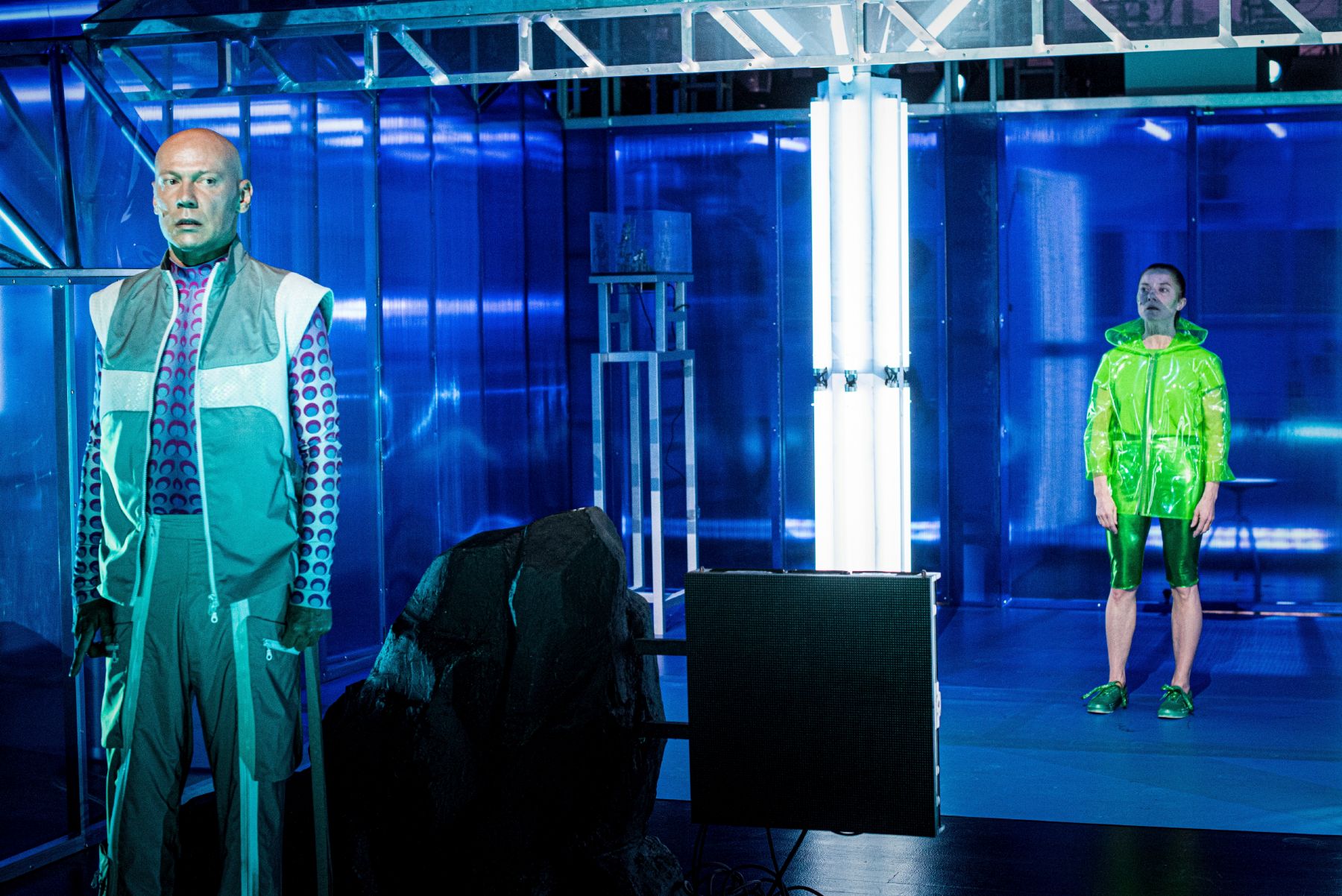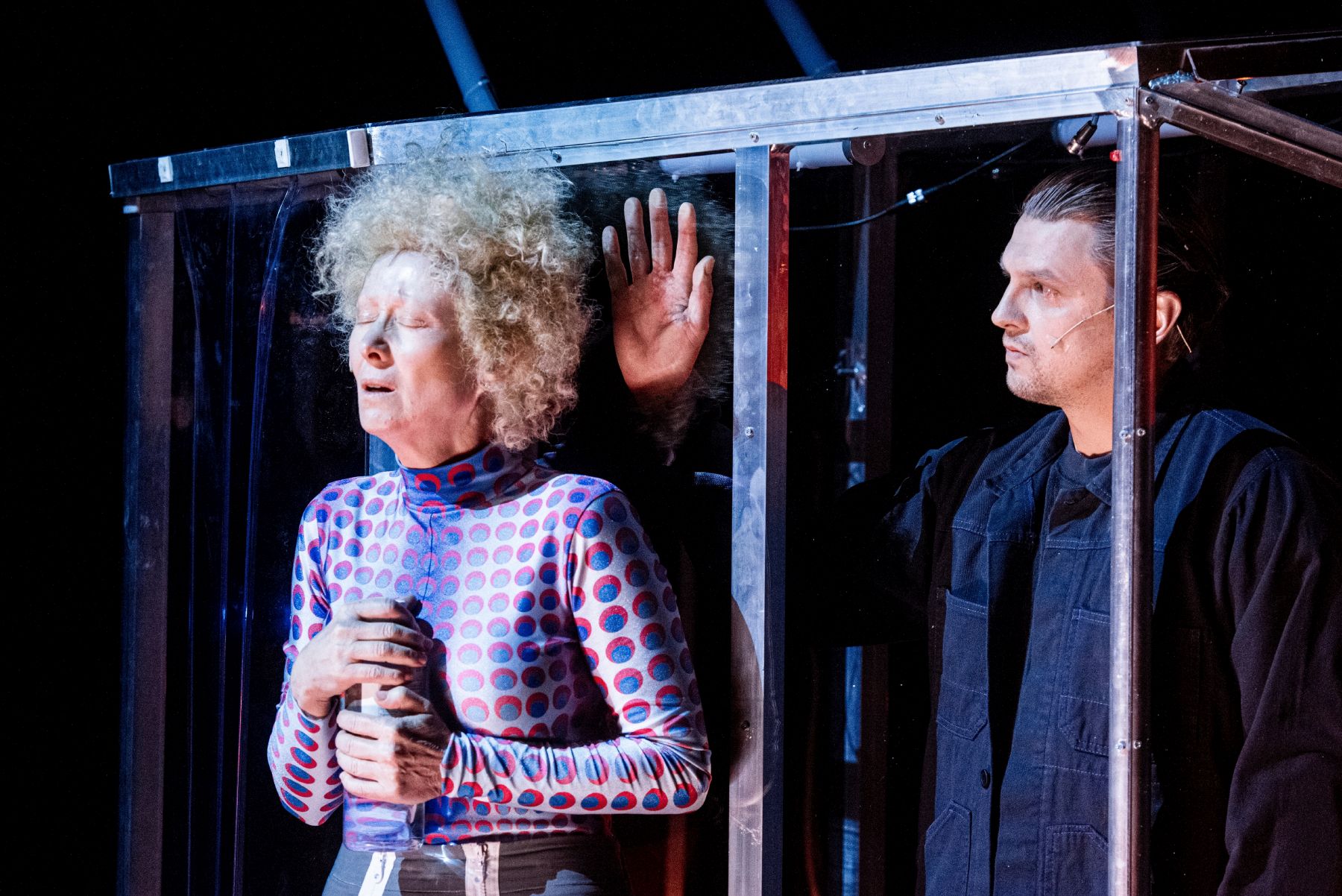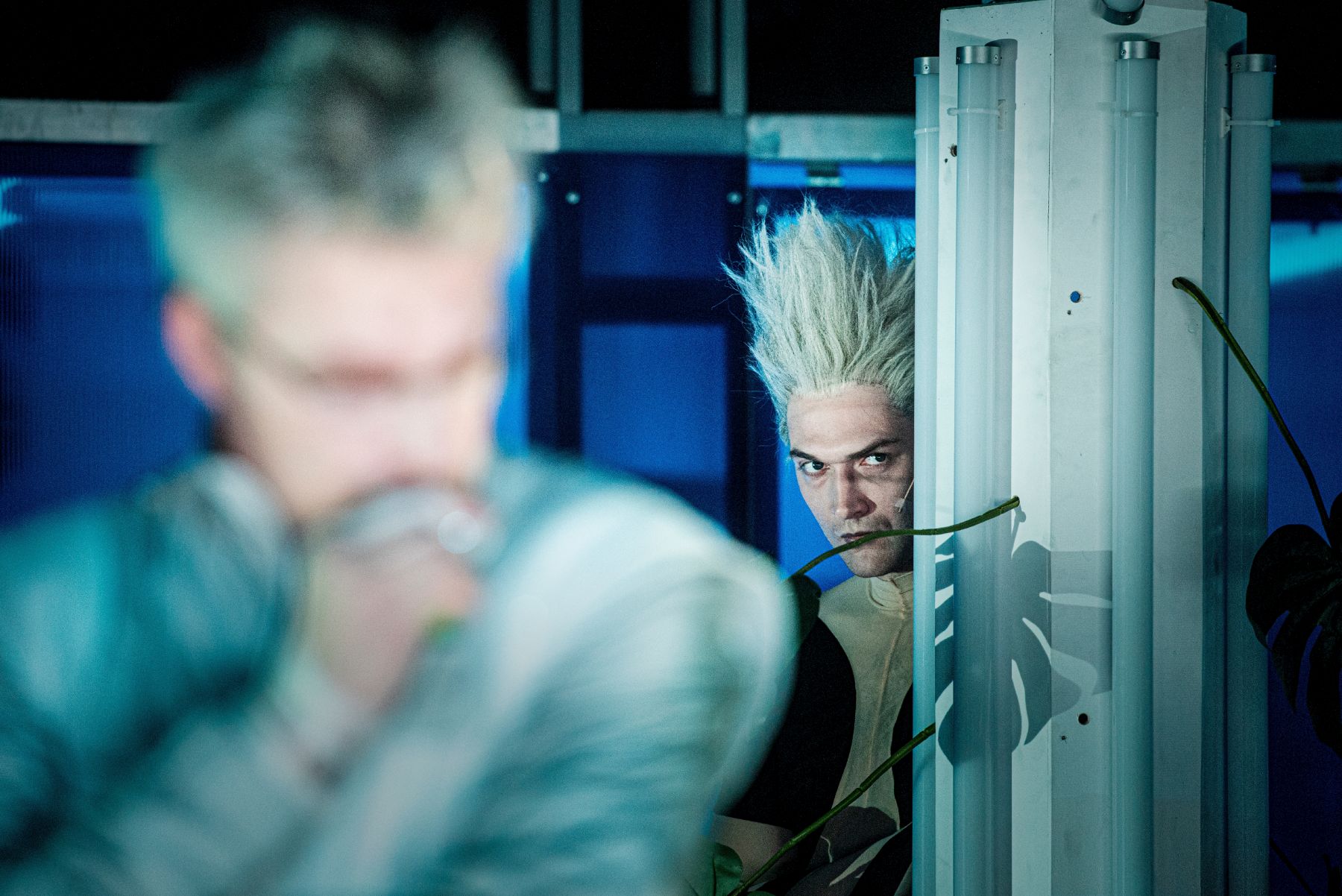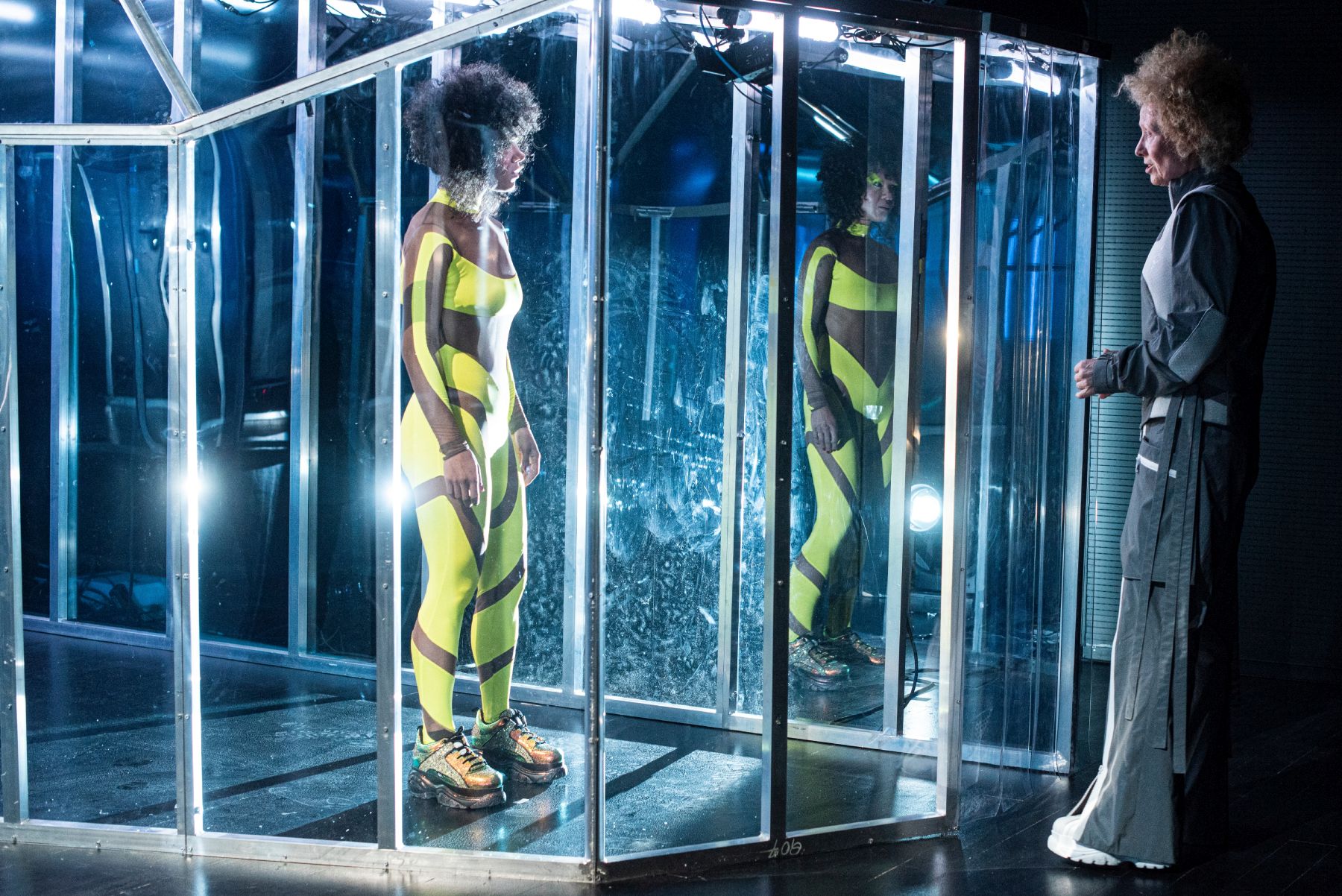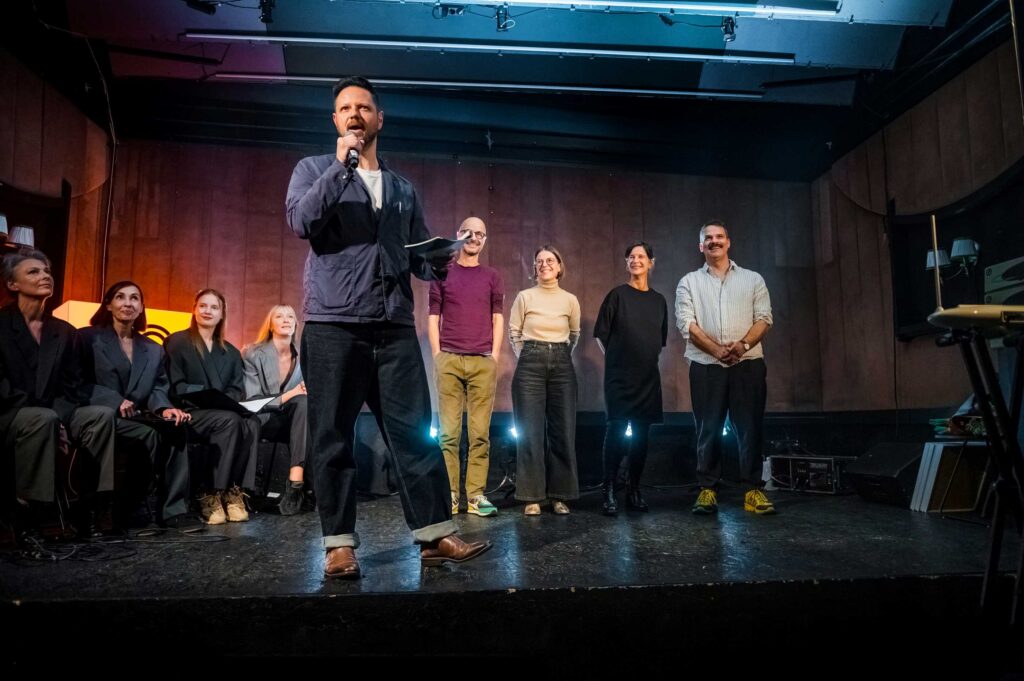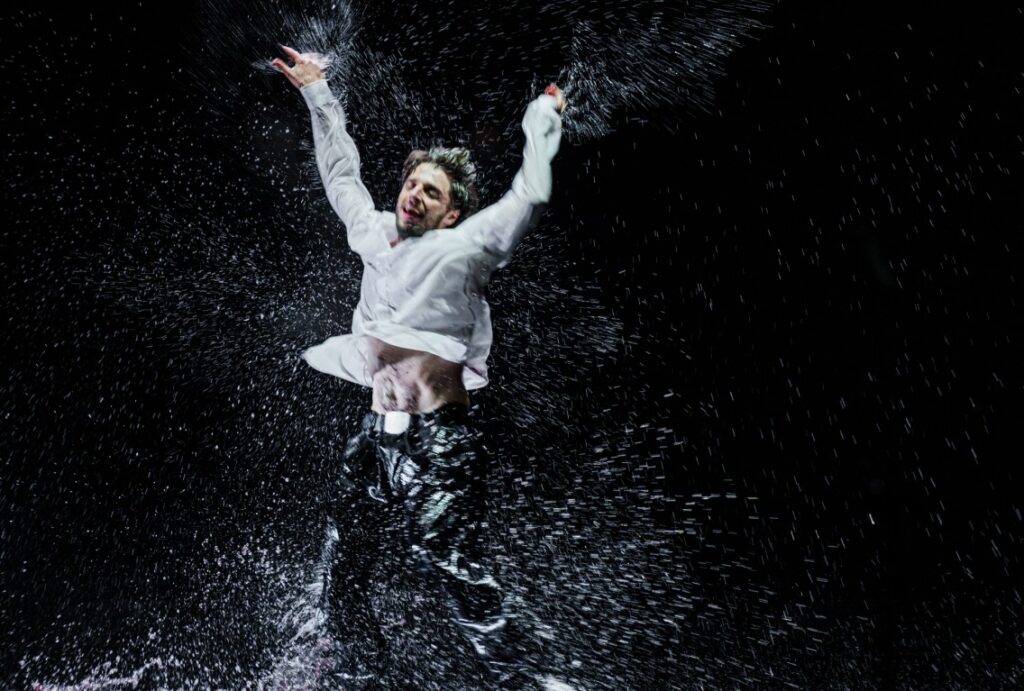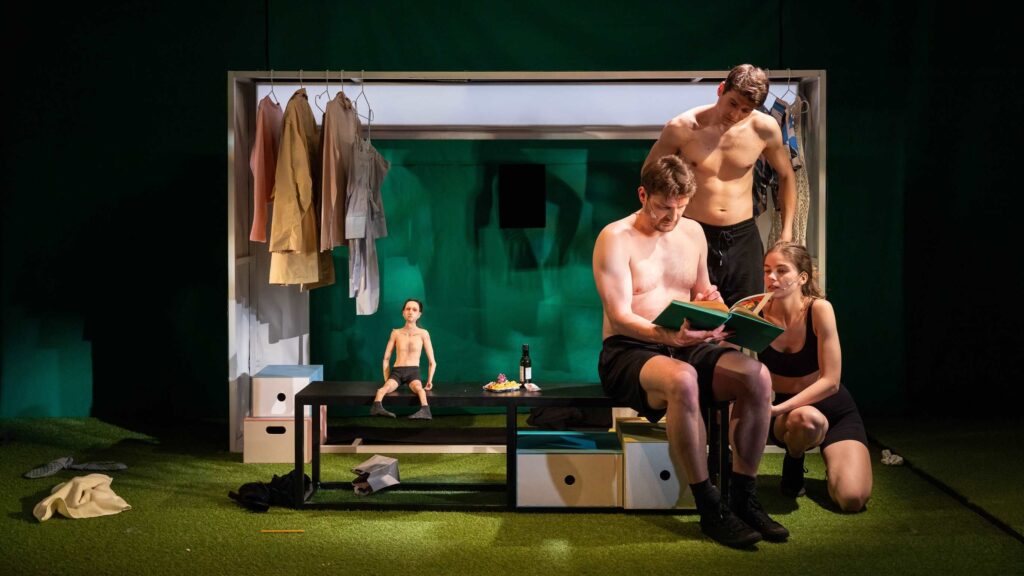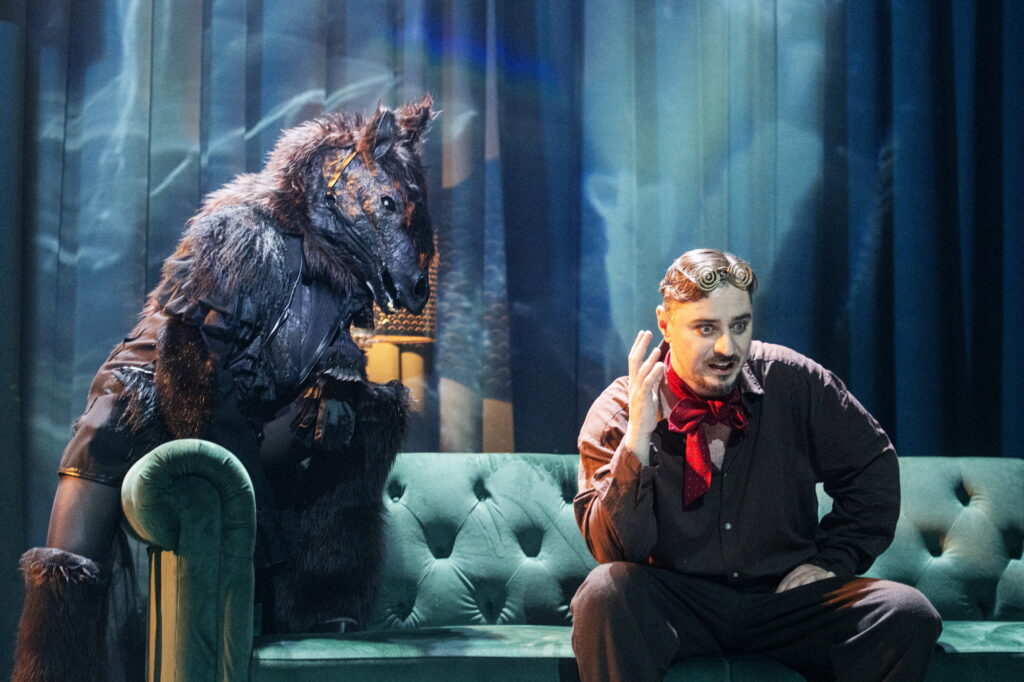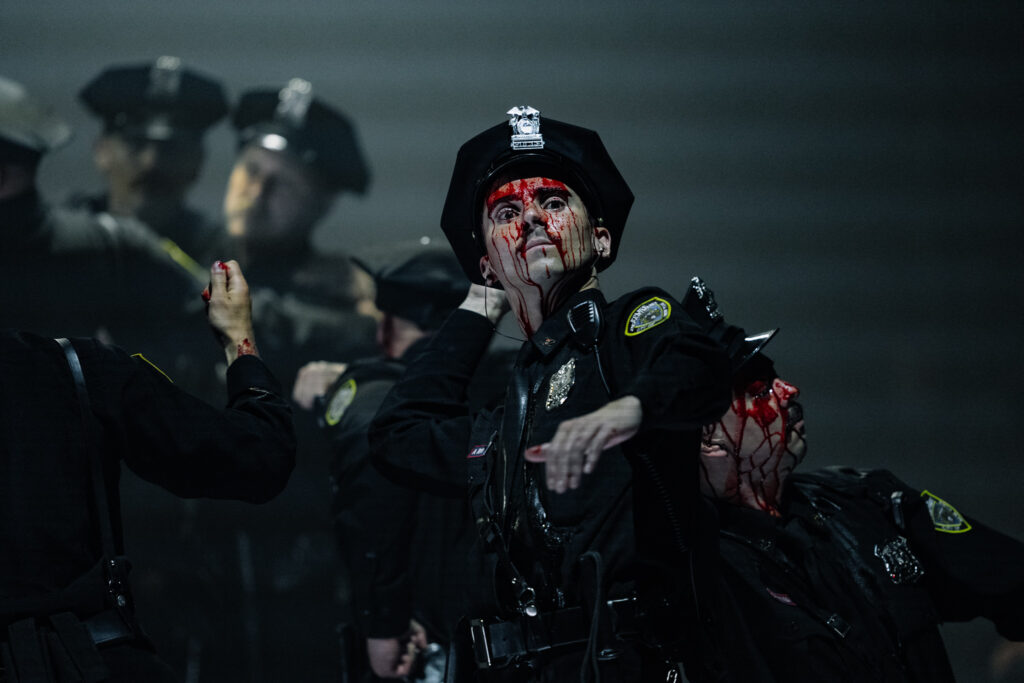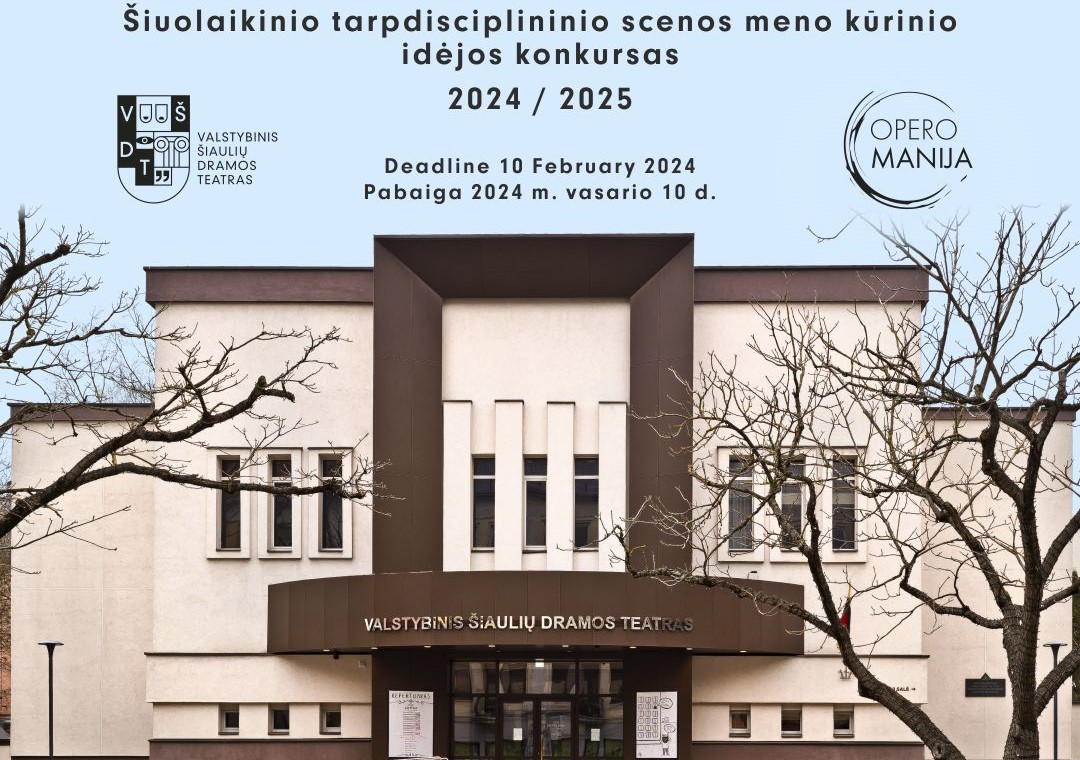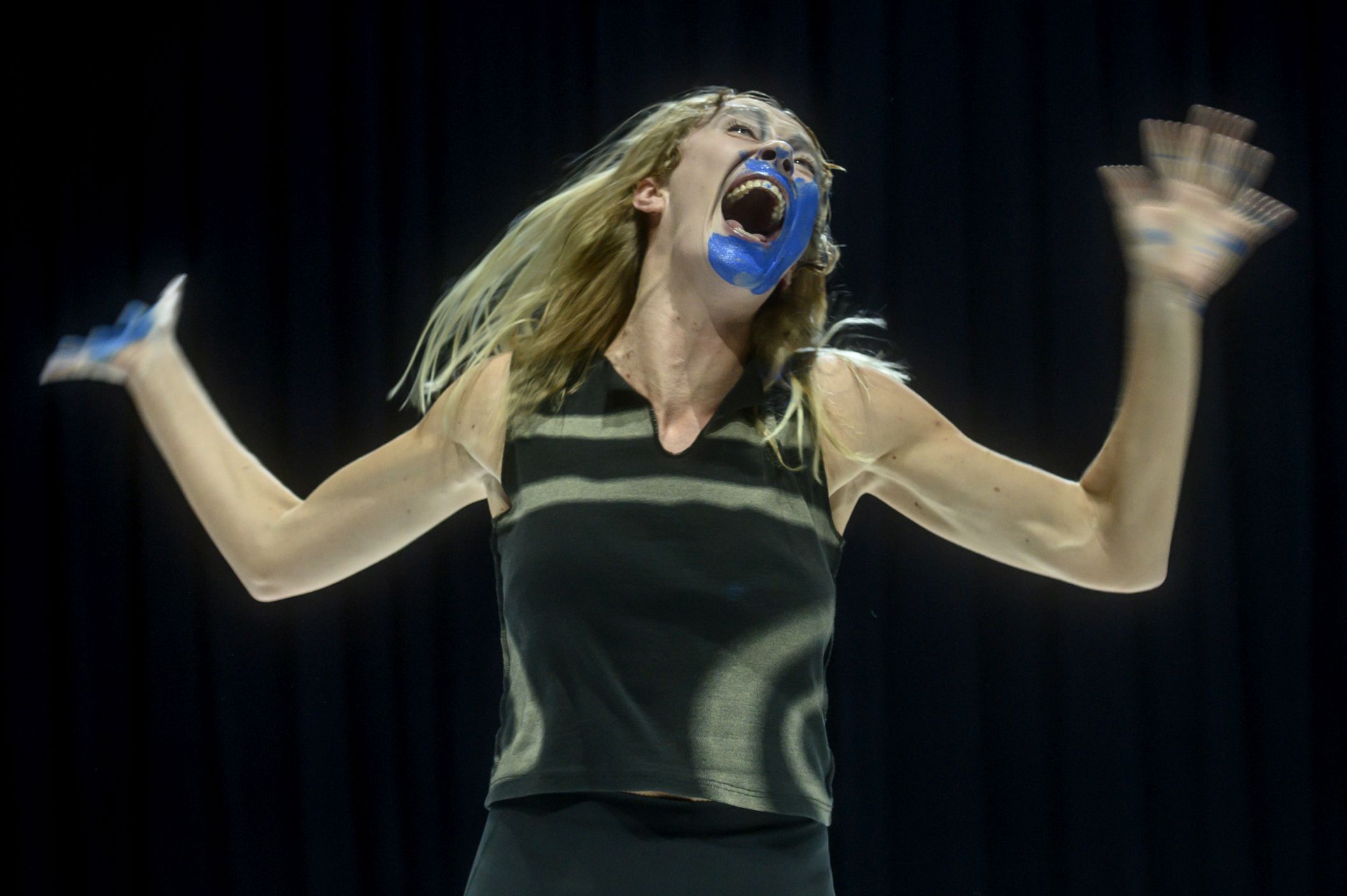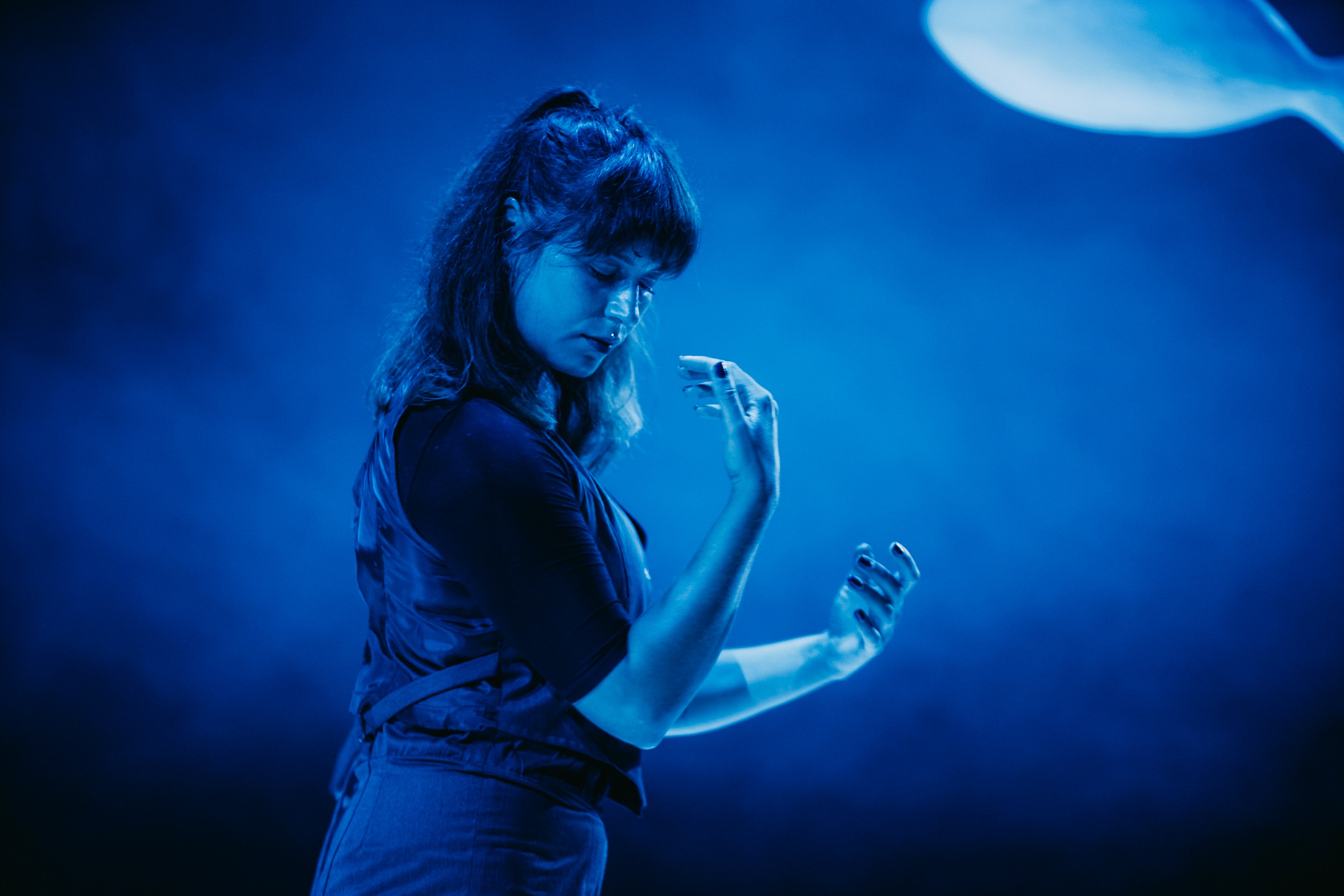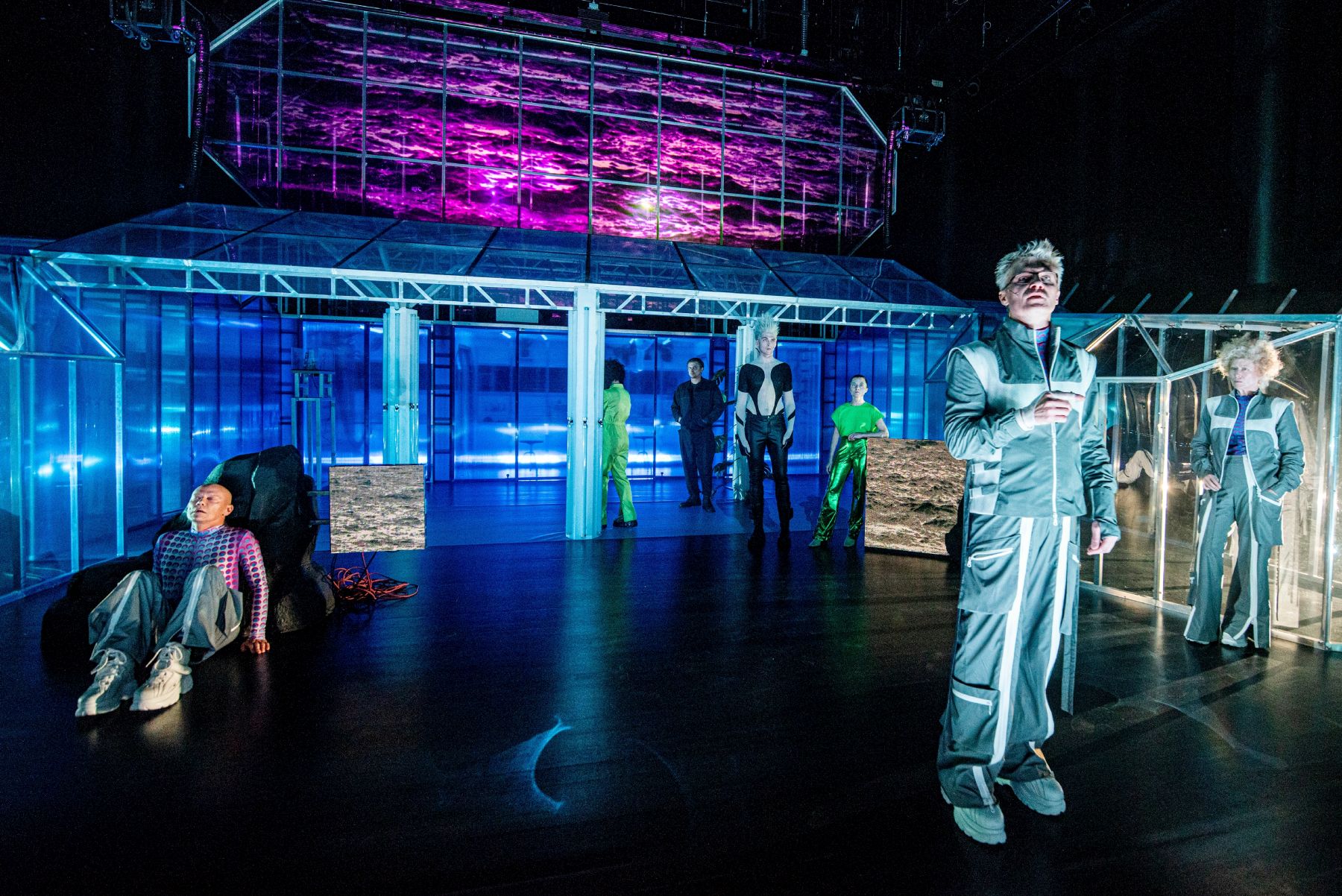
The theatre director Grzegorz Jarzyna chose the title Solaris 4 for his interpretation of the famous sci-fi novel by Stanisław Lem, which was first published in 1961, has been translated into 36 languages, and has twice been made into a film. Hence, this is the fourth journey to the planet Solaris, and the first production at the Lithuanian National Drama Theatre after several years of renovation, and since the pandemic lockdown. Jarzyna's work is the first première to be staged in the theatre's revamped auditorium.
This manifold event was also noted by reviewers. In her article for the cultural weekly 7 meno dienos, the theatre critic Alma Braškytė cheerfully wrote: 'This refreshing feeling of freedom related to the new, surprisingly tall, space of the theatre allowed us to breathe easily. Long-unseen faces, without the mandatory medical masks, and the rather forgotten closeness of people in a hall, without the gaps of unoccupied seats standing out. A constellation of prominent actors ...' According to Braškytė, this resulted in 'a naturally explosive mixture of actual circumstances and expectations'. Other writers noted that the special atmosphere associated with the reopening of the theatre also increased the expectations of the première.
The most favourable reviews of Solaris 4 were by Lithuania's younger generation of theatre specialists, whereas older critics were not taken in by the production's utterances and its distance from Lem's novel. The significant disappointment among older theatre critics was caused by the fact that the ocean, which the novel depicts as reasoning and capable of materialising the thoughts of visitors, was reduced to mere imagery in the production. Few reviewers could understand why Jarzyna had decided to replace the central character of the novel, the psychologist Dr Kris Kelvin, with a female character, a psychologist called Krista. All the reviewers noted that the director cast it in such a way that the roles brought up associations with other characters previously played by the same actors. For example, Nelė Savičenko, who played the role of Krista, and Martynas Nedzinskas, acting her husband Harry, who commits suicide, had played the parts of the mother and the son in The Seagull directed by Oskaras Koršunovas. Gytis Ivanauskas, appearing as the scientist Dr Snaut, and Rasa Samuolytė (his sister) were partners (as brother and sister) in Fireface, another production directed by Oskaras Koršunovas.
Let us first look at the reviews by two younger writers. The theatre researcher, dramatist and writer Dovilė Zavedskaitė (menufaktura.lt) writes: 'I specifically remember that ocean. Also, the music of the ocean, and the darkness of the ocean. And the way this ocean approaches us through darkness, turning into a wave, clouds, salt. Transforming into something unknown, anything. What matters is that it is coming [...] Then you realise that the production has defeated you. Broken through.'
Zavedskaitė further writes: 'The production acts as a carrousel of a variety of traumas, with circling horses, swans and teddy-bears of trauma; like the suicide of someone close, alcoholism, sexual abuse, or the psychological violence of sister-brother-and-others-in-the-room. I have no doubt that every spectator will find something to choose from, and everyone will indulge in the pleasure of self-identification. And this is when you come to enjoy the fragmented, spatially scattered and seemingly unrevealing dramaturgy by Tomasz Spiewak [...] The directing of Grzegorz Jarzyna functions in a dreamlike way: it acts as a dream machine, generating impulses, hints and touches, to stimulate in the way that music does, inexplicably, corporeally, emotionally. It operates so that you could drag and tie your life to your seat, since you are surrounded by its signs and shapes. We are all hurt by the same things, and Grzegorz knows that.'
The performing arts critic Aušra Kaminskaitė, a reviewer for the popular Internet portal 15min.lt, went to the press conference before the première, and noted in her article on Solaris 4: 'It was discomforting and sad to hear the most prominent actors, who had worked with major Lithuanian directors, say that before Jarzyna they had never experienced such attention to personality, and such a human approach, from any other director [...] By the way, relations serve as a pivotal category in Solaris 4: the concept serves as a key to the human mind, where the facts are overshadowed by the personal approach towards them.'
The critic is 'eager to read' the stories of the characters in Solaris 4 as 'a diagnosis of a certain part of Lithuanian theatre'. According to Kaminskaitė, the duo of Snaut (Ivanauskas) and Sister (Samuolytė) is 'a yearning for the theatre of times past, or perhaps an illustration of Jarzyna's own theatrical path, from when he first saw the actors on stage to when he actually started working with them. A physically incapable and yet authoritative Gibarian cannot function without a woman by his side, as a representation of the theatre's idols, whose experience and professional skills deserve the highest praise; however, today their creative expression is inert, no longer conveying the impression that brought them to the ranks of the theatrical elite several decades earlier.'
Kaminskaitė concludes that in this production 'Jarzyna acknowledges the influence every person exerts upon the ocean, i.e. the formation of the world. Therefore, his hero is a person capable of facing his or her shame, fear and desperation. It is not a superman with extraordinary abilities, but rather a brave person, straightforwardly approaching his or her deepest fears. Apparently, this is the key to the change proposed by the director: let us put our house in order, and the ocean will reward the whole world for it.'
The theatre critics of the older generation did not find such deep insights in Solaris 4, and were rather harsh in their assessment of the première. 'I believe the expression “he would turn in his grave” is in order here,' wrote the theatre reviewer Jūratė Visockaitė in the cultural weekly Literatūra ir menas, referring to the author of the novel. The reviewer was horrified that the creators of the production expanded the agonising memories of Lem's characters with 'sexual dramas', where 'the shameful or traumatic workings of the subconscious can only be traced via hints, and were not explicitly associated with sex.' Outraged with the abundance of screens and recorded footage on the stage, Visockaitė regrets that 'Here, the living actor and the narrative obscured by the technology are given a supporting role only. Performers waiting for their entrance in the wings and backstage of Solaris, while the performance flickers and draws to a close, appear to be weary and confused, alone in the jelly of this ocean. Cinema shown on theatre sets is bad cinema.'
Ramunė Balevičiūtė (menufaktura.lt) was also fairly harsh in diagnosing the issues of the première: 'In the piece by Grzegorz Jarzyna, concepts sparkle like shooting stars; however, they never form a single network of associations, allowing us to perceive or feel the director's idea. A significant portion of the philosophical charge in Lem's novel was neutralised in the performance, and the creators of Solaris 4 do not appear to be trying to disguise this fact: the first scenes in the performance feature onscreen episodes of remote psychotherapy consultations. These episodes, some fairly realistic, some cartoonish, might serve as the key to the concept of the piece. Lem's philosophical contemplations on human nature and the limits of perception are transformed into an analysis of the characters' past traumas, at times verging on pop psychology.
Balevičiūtė's conclusion is: 'As the performance draws to an end, it turns out that the Solaris research station is represented by this theatre, which has just reopened after its refurbishment. We can see images depicting the creation of the new auditorium, whereas Gibarian (acted by Arūnas Sakalauskas in a hard hat, as a construction worker) advertises the new research station. This twist is not very unexpected; neither does it appear to be well founded, or contribute meaningfully to the stage interpretation. It seems that the creators of Solaris 4 are bluffing slightly, since their creation, a visually impeccable product, has not turned into a human or a theatre research laboratory'. It should be pointed out that the set for the production was designed by Fabien Lédé, and the costumes and make-up are by Anna Axer-Fijalkowska.
Alma Braškytė, who is quoted at the beginning of this review, admits that Jarzyna has created a piece to a high standard; however, she thinks that the 'horizon of meanings' of the work is locked into a tight scheme. The critic claims: 'Jarzyna's Solaris 4 is entirely focussed on the psychology of relations between Krista, Snaut, Sartorius and pairs of their visitors, or to be more precise, the pathological and traumatic aspects of these relationships [...] These relations can be identified; this way, they can essentially be fully explained, analysed, expressed or “exhausted”, as certain psychological (or even clinical) cases. There is no other space behind these words. Perhaps the most interesting part of the spectacle is the relationship between Sartorius and Creature F, evoking a more universal interpretation: to what extent are the offences committed by us extenuated by our sacrifices? Is guilt inevitable? Is there a cure for guilt?'
The criticism of Grzegorz Jarzyna's Solaris 4 was summed up by the theatre researcher Vlada Kalpokaitė (menufaktura.lt), who noted that this fourth journey to the planet Solaris attracted significant attention, due to the fact that Stanisław Lem's novel, and especially the film adaptation by Andrei Tarkovsky, has a devoted following for a reason. Solaris requires commitment. Meanwhile, Jarzyna rewrote the universal themes of Solaris, adapting them ... to the pandemic period, and the loneliness of a person in lockdown, surrounded by various screens. According to Kalpokaitė: 'While Lem's text makes it hard to perceive Kris Kelvin as a professional psychologist, Jarzyna's production turns the profession of Krista (Nelė Savičenko) into the strongest conceptual link between the novel and the play, seemingly the main reason to tackle this material here and now. We could say that psychotherapy sessions, research with elements of psychodrama, take place throughout the production [...] still, Solaris. In this ocean, you shall see through, rather than just see; discern and agonise, when it does not happen; face the invisible and impenetrable, and eventually dare to make up your mind, so that the ocean can see you. Otherwise, the ocean turns into a trite metaphor, a mere act by theatrical smoke machines.'

